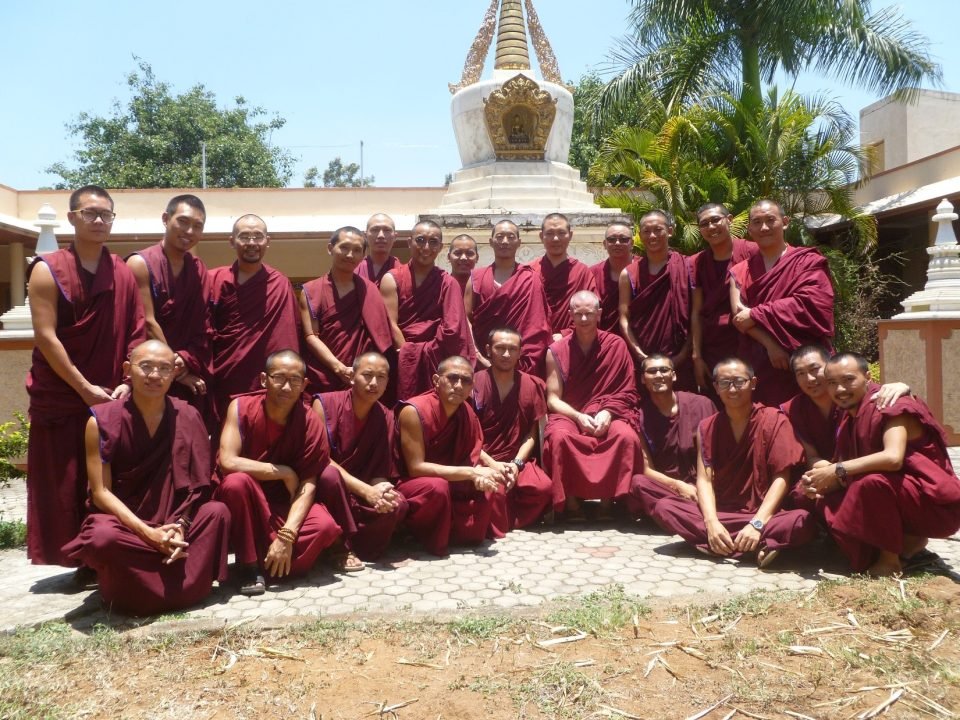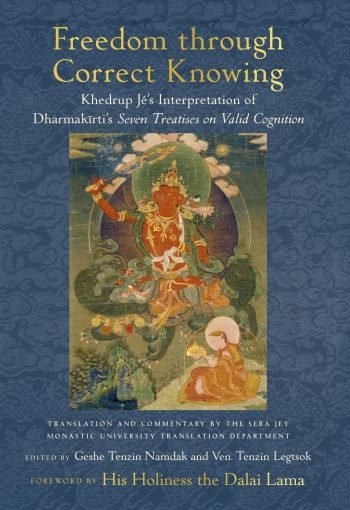- Home
- FPMT Homepage
Foundation for the Preservation of the Mahayana Tradition
The FPMT is an organization devoted to preserving and spreading Mahayana Buddhism worldwide by creating opportunities to listen, reflect, meditate, practice and actualize the unmistaken teachings of the Buddha and based on that experience spreading the Dharma to sentient beings. We provide integrated education through which people’s minds and hearts can be transformed into their highest potential for the benefit of others, inspired by an attitude of universal responsibility and service. We are committed to creating harmonious environments and helping all beings develop their full potential of infinite wisdom and compassion. Our organization is based on the Buddhist tradition of Lama Tsongkhapa of Tibet as taught to us by our founders Lama Thubten Yeshe and Lama Thubten Zopa Rinpoche.
- Willkommen
Die Stiftung zur Erhaltung der Mahayana Tradition (FPMT) ist eine Organisation, die sich weltweit für die Erhaltung und Verbreitung des Mahayana-Buddhismus einsetzt, indem sie Möglichkeiten schafft, den makellosen Lehren des Buddha zuzuhören, über sie zur reflektieren und zu meditieren und auf der Grundlage dieser Erfahrung das Dharma unter den Lebewesen zu verbreiten.
Wir bieten integrierte Schulungswege an, durch denen der Geist und das Herz der Menschen in ihr höchstes Potential verwandelt werden zum Wohl der anderen – inspiriert durch eine Haltung der universellen Verantwortung und dem Wunsch zu dienen. Wir haben uns verpflichtet, harmonische Umgebungen zu schaffen und allen Wesen zu helfen, ihr volles Potenzial unendlicher Weisheit und grenzenlosen Mitgefühls zu verwirklichen.
Unsere Organisation basiert auf der buddhistischen Tradition von Lama Tsongkhapa von Tibet, so wie sie uns von unseren Gründern Lama Thubten Yeshe und Lama Thubten Zopa Rinpoche gelehrt wird.
- Bienvenidos
La Fundación para la preservación de la tradición Mahayana (FPMT) es una organización que se dedica a preservar y difundir el budismo Mahayana en todo el mundo, creando oportunidades para escuchar, reflexionar, meditar, practicar y actualizar las enseñanzas inconfundibles de Buda y en base a esa experiencia difundir el Dharma a los seres.
Proporcionamos una educación integrada a través de la cual las mentes y los corazones de las personas se pueden transformar en su mayor potencial para el beneficio de los demás, inspirados por una actitud de responsabilidad y servicio universales. Estamos comprometidos a crear ambientes armoniosos y ayudar a todos los seres a desarrollar todo su potencial de infinita sabiduría y compasión.
Nuestra organización se basa en la tradición budista de Lama Tsongkhapa del Tíbet como nos lo enseñaron nuestros fundadores Lama Thubten Yeshe y Lama Zopa Rinpoche.
A continuación puede ver una lista de los centros y sus páginas web en su lengua preferida.
- Bienvenue
L’organisation de la FPMT a pour vocation la préservation et la diffusion du bouddhisme du mahayana dans le monde entier. Elle offre l’opportunité d’écouter, de réfléchir, de méditer, de pratiquer et de réaliser les enseignements excellents du Bouddha, pour ensuite transmettre le Dharma à tous les êtres. Nous proposons une formation intégrée grâce à laquelle le cœur et l’esprit de chacun peuvent accomplir leur potentiel le plus élevé pour le bien d’autrui, inspirés par le sens du service et une responsabilité universelle. Nous nous engageons à créer un environnement harmonieux et à aider tous les êtres à épanouir leur potentiel illimité de compassion et de sagesse. Notre organisation s’appuie sur la tradition guéloukpa de Lama Tsongkhapa du Tibet, telle qu’elle a été enseignée par nos fondateurs Lama Thoubtèn Yéshé et Lama Zopa Rinpoché.
Visitez le site de notre Editions Mahayana pour les traductions, conseils et nouvelles du Bureau international en français.
Voici une liste de centres et de leurs sites dans votre langue préférée
- Benvenuto
L’FPMT è un organizzazione il cui scopo è preservare e diffondere il Buddhismo Mahayana nel mondo, creando occasioni di ascolto, riflessione, meditazione e pratica dei perfetti insegnamenti del Buddha, al fine di attualizzare e diffondere il Dharma fra tutti gli esseri senzienti.
Offriamo un’educazione integrata, che può trasformare la mente e i cuori delle persone nel loro massimo potenziale, per il beneficio di tutti gli esseri, ispirati da un’attitudine di responsabilità universale e di servizio.
Il nostro obiettivo è quello di creare contesti armoniosi e aiutare tutti gli esseri a sviluppare in modo completo le proprie potenzialità di infinita saggezza e compassione.
La nostra organizzazione si basa sulla tradizione buddhista di Lama Tsongkhapa del Tibet, così come ci è stata insegnata dai nostri fondatori Lama Thubten Yeshe e Lama Zopa Rinpoche.
Di seguito potete trovare un elenco dei centri e dei loro siti nella lingua da voi prescelta.
- 欢迎 / 歡迎
简体中文
“护持大乘法脉基金会”( 英文简称:FPMT。全名:Foundation for the Preservation of the Mahayana Tradition) 是一个致力于护持和弘扬大乘佛法的国际佛教组织。我们提供听闻,思维,禅修,修行和实证佛陀无误教法的机会,以便让一切众生都能够享受佛法的指引和滋润。
我们全力创造和谐融洽的环境, 为人们提供解行并重的完整佛法教育,以便启发内在的环宇悲心及责任心,并开发内心所蕴藏的巨大潜能 — 无限的智慧与悲心 — 以便利益和服务一切有情。
FPMT的创办人是图腾耶喜喇嘛和喇嘛梭巴仁波切。我们所修习的是由两位上师所教导的,西藏喀巴大师的佛法传承。
繁體中文
護持大乘法脈基金會”( 英文簡稱:FPMT。全名:Found
ation for the Preservation of the Mahayana Tradition ) 是一個致力於護持和弘揚大乘佛法的國際佛教組織。我們提供聽聞, 思維,禪修,修行和實證佛陀無誤教法的機會,以便讓一切眾生都能 夠享受佛法的指引和滋潤。 我們全力創造和諧融洽的環境,
為人們提供解行並重的完整佛法教育,以便啟發內在的環宇悲心及責 任心,並開發內心所蘊藏的巨大潛能 — 無限的智慧與悲心 – – 以便利益和服務一切有情。 FPMT的創辦人是圖騰耶喜喇嘛和喇嘛梭巴仁波切。
我們所修習的是由兩位上師所教導的,西藏喀巴大師的佛法傳承。 察看道场信息:
- FPMT Homepage
- News/Media
-
- Study & Practice
-
-
- About FPMT Education Services
- Latest News
- Programs
- New to Buddhism?
- Buddhist Mind Science: Activating Your Potential
- Heart Advice for Death and Dying
- Discovering Buddhism
- Living in the Path
- Exploring Buddhism
- FPMT Basic Program
- FPMT Masters Program
- FPMT In-Depth Meditation Training
- Maitripa College
- Lotsawa Rinchen Zangpo Translator Program
- Universal Education for Compassion & Wisdom
- Online Learning Center
-
- Prayers & Practice Materials
- Overview of Prayers & Practices
- Full Catalogue of Prayers & Practice Materials
- Explore Popular Topics
- Benefiting Animals
- Chenrezig Resources
- Death & Dying Resources
- Lama Chopa (Guru Puja)
- Lama Zopa Rinpoche: Compendium of Precious Instructions
- Lama Zopa Rinpoche: Life Practice Advice
- Lama Zopa Rinpoche Practice Series
- Lamrim Resources
- Mantras
- Prayer Book Updates
- Purification Practices
- Sutras
- Thought Transformation (Lojong)
- Audio Materials
- Dharma Dates - Tibetan Calendar
- Translation Services
- Publishing Services
- Ways to Offer Support
- Prayers & Practice Materials
-
- Teachings and Advice
- Find Teachings and Advice
- Lama Zopa Rinpoche Advice Page
- Lama Zopa Rinpoche: Compendium of Precious Instructions
- Lama Zopa Rinpoche Video Teachings
- ༧སྐྱབས་རྗེ་བཟོད་པ་རིན་པོ་ཆེ་མཆོག་ནས་སྩལ་བའི་བཀའ་སློབ་བརྙན་འཕྲིན།
- Podcasts
- Lama Yeshe Wisdom Archive
- Buddhism FAQ
- Dharma for Young People
- Resources on Holy Objects
- Teachings and Advice
-
-
*If a menu item has a submenu clicking once will expand the menu clicking twice will open the page.
-
-
- Centers
-
- Teachers
-
- Projects
-
-
-
-
*If a menu item has a submenu clicking once will expand the menu clicking twice will open the page.
-
-
- FPMT
-
-
-
-
-
Lama Thubten Yeshe
-
-
-
- Shop
-
-
-
The Foundation Store is FPMT’s online shop and features a vast selection of Buddhist study and practice materials written or recommended by our lineage gurus. These items include homestudy programs, prayers and practices in PDF or eBook format, materials for children, and other resources to support practitioners.
Items displayed in the shop are made available for Dharma practice and educational purposes, and never for the purpose of profiting from their sale. Please read FPMT Foundation Store Policy Regarding Dharma Items for more information.
-
-
3
We are pleased to share news about a book that is a unique collaboration between the monks of Sera Jey Monastery Translation Department and Sera IMI House. Just released by Wisdom Publications, Freedom though Correct Knowing; Khedrup Jé’s Interpretation of Dharmakīrti’s Seven Treatise on Valid Cognition is a translation and contemporary explanation of pivotal sections of Khedrup Jé’s most extensive treatise on Buddhist logic and epistemology. Ven. Tenzin Legtsok, who assisted with editing and translation of this book, as well as shaping the final form, shares some background information on how this project came to be.
In his foreword to the book, Freedom though Correct Knowing; Khedrup Jé’s Interpretation of Dharmakīrti’s Seven Treatise on Valid Cognition, His Holiness the Dalai Lama traces the historical development of this branch of Buddhist thought from ancient India up to the current work with the observation that:
While one may engage in the teachings of Buddha Shakyamuni by means of faith, the ideal way to truly appreciate and embrace the doctrine of the Buddha is through inquiry and critical reasoning. The Buddha himself has said:
Oh, monks and scholars, just as you test gold
By burning, cutting, and rubbing,
So too examine my speech well;
Do not accept it merely out of respect.
The collaboration that has given rise to this work began fourteen years ago when Geshe Tenzin Namdak was asked to start a program at Sera Jey Monastery to educate monks with basic English in English Dharma vocabulary and the skills to do written and oral translations from Tibetan. This project gradually grew into the Sera Je Monastic University Translation Department which now also includes training in translation from Tibetan to Chinese. In subsequent years myself, Tenzin Namjong, and Lobsang Tsondru also served as regular teachers in the program and other monks of Sera IMI House helped with editing and supplementing the translations made for this book. It is a valuable precedent set by the great scholars who labored to translate the Buddhist canon from Sanskrit to Tibetan that interpretations were always made as a collaboration between native speakers of both the source and the target language. We have tried to follow their lead.

Geshe Tenzin Namdak with students from the Sera Jey Monastery Translation Department at Sera IMI House, 2017.
When His Holiness learned of the Translation Department during a visit to Sera Monastery in 2013, He suggested that we translate Khedrup Jé’s Clearing Mental Darkness: An Ornament of Dharmakīrti’s “Seven Treatises on Valid Cognition” (Tshad ma sde bdun gyi rgyan yid kyi mun sel). Seeing that it would be extremely difficult for most English readers to follow parts of this work involving detailed debates between the author and opposing views, Geshe Namdak first identified sections that clearly set out Khedrup Jé’s own positions and some central debates. Next, Geshe Namdak and myself worked for several years with groups of Tibetan speaking monastic translator students making draft translations. Once this was done it became clear that we needed native English speakers to convert the work of different groups of translators into text having uniform style and vocabulary. Also, we deemed that this work would be even more useful to a wider range of readers by supplementing Khedrup Jé’s presentation with explanations of many basic concepts and terms that he assumes readers are conversant with since they are covered in the early years of the Tibetan Buddhist philosophy programs. To develop this content, we requested the assistance of other IMI House monks, especially Venerables Tenzin Namjong, Tenzin Gache, and Dan Frey. With all this content gathered together, Geshe Namdak and myself primarily took responsibility for shaping the book into its final form having smooth progression from topic to topic, a rich glossary, and helpful appendices.
Currently Geshe Namdak is the resident teacher at Jamyang Center in London teaching several extensive FPMT programs simultaneously including the newly developed Exploring Buddhism. Myself and Tenzin Namjong teach regularly at Choe KhorSum Ling Centre in Bangalore, for Ocean of Compassion Center online, and are engaged in translation and editing work for FPMT Education Services. Tenzin Gache recently published a translation of Kyabje Choden Rinpoche’s instructions on calm abiding and Mahamudra entitled, Mastering Meditation, and is working on a forthcoming translation of instructions on six-session guru yoga. Dan Frey is newly working with Wisdom Publications to help develop their online platform. There are now four junior monks at IMI House engaged in the early years of the Geshe Studies Program and several other Western monks at Sera at various stages of their studies. We hope that more men and women from Western and other countries will also undertake studies and practice at Sera and other traditional Tibetan Buddhist institutions to continue this work while the opportunity still exists.
It is only through the inspiration of His Holiness the Dalai Lama that we dared to embark on such an undertaking, through the guidance of Lama Zopa Rinpoche for Sera IMI House since its inception, and through the inexpressible kindness of our teachers and peers at Sera Jey that this work has been possible. May it bring much benefit.
“Freedom through Correct Knowing presents the core part of Khedrup Jé’s Clearing Mental Darkness, which is famed for its clear and comprehensive analysis of key issues of importance for Buddhist epistemology. Through this book the reader can join Khedrup Jé’s brilliant mind as he engages with important questions of logic and epistemology via a dialogical format that powerfully guides the reader.”
—Thupten Jinpa, founder, Institute of Tibetan Classics; founder, Compassion Institute; translator of major Tibetan works in The Library of Tibetan Classics and author of Tsongkhapa: A Buddha in the Land of Snows
“Serious students of Buddhist philosophy will delight in this translation of Khedrup Jé’s text on valid cognition, carefully and generously supplemented by commentary that draws on other classic Tibetan treatises. The chapter on the four truths is the crowning jewel, providing an elaborate account of how we enter into and free ourselves from cycling in samsara. The six appendices kindly offer a complementary map of important topics touched on but not explained in the root text. This is a beautiful handbook for those desiring a detailed map of the path to awakening and the role different types of mind play in this.”
—Bhiksuni Thubten Chodron, abbess of Sravasti Abbey and author of Buddhism for Beginners
“In the present so-called post-truth era, where misinformation abounds, it is crucial to be able to differentiate between fact and fiction and between valid and invalid ways of knowing something. Freedom through Correct Knowing provides the Buddhist analytical tools needed for this task, as interpreted by two of the greatest Tibetan Gelugpa scholars, Khedrup Jé and his commentator Purbu Chok. To open up the meaning of the technical language of the text, the editors have interspersed clear explanations and have added generous appendices with background material. The translators and editors are to be congratulated on this beautifully written, welcome contribution to our understanding of how the mind works.”
—Dr. Alexander Berzin, founder, studybuddhism.com, a project of the Berzin Archives
To order a hardcopy edition of Freedom though Correct Knowing; Khedrup Jé’s Interpretation of Dharmakīrti’s Seven Treatise on Valid Cognition from Wisdom Publications: https://wisdomexperience.org/product/freedom-through-correct-knowing/
For an ebook version from the FPMT Foundation Store: https://shop.fpmt.org/Freedom-Through-Correct-Knowing-eBook-_p_3739.html
- Home
- News/Media
- Study & Practice
- About FPMT Education Services
- Latest News
- Programs
- New to Buddhism?
- Buddhist Mind Science: Activating Your Potential
- Heart Advice for Death and Dying
- Discovering Buddhism
- Living in the Path
- Exploring Buddhism
- FPMT Basic Program
- FPMT Masters Program
- FPMT In-Depth Meditation Training
- Maitripa College
- Lotsawa Rinchen Zangpo Translator Program
- Universal Education for Compassion & Wisdom
- Online Learning Center
- Prayers & Practice Materials
- Overview of Prayers & Practices
- Full Catalogue of Prayers & Practice Materials
- Explore Popular Topics
- Benefiting Animals
- Chenrezig Resources
- Death & Dying Resources
- Lama Chopa (Guru Puja)
- Lama Zopa Rinpoche: Compendium of Precious Instructions
- Lama Zopa Rinpoche: Life Practice Advice
- Lama Zopa Rinpoche Practice Series
- Lamrim Resources
- Mantras
- Prayer Book Updates
- Purification Practices
- Sutras
- Thought Transformation (Lojong)
- Audio Materials
- Dharma Dates – Tibetan Calendar
- Translation Services
- Publishing Services
- Teachings and Advice
- Find Teachings and Advice
- Lama Zopa Rinpoche Advice Page
- Lama Zopa Rinpoche: Compendium of Precious Instructions
- Lama Zopa Rinpoche Video Teachings
- ༧སྐྱབས་རྗེ་བཟོད་པ་རིན་པོ་ཆེ་མཆོག་ནས་སྩལ་བའི་བཀའ་སློབ་བརྙན་འཕྲིན།
- Podcasts
- Lama Yeshe Wisdom Archive
- Buddhism FAQ
- Dharma for Young People
- Resources on Holy Objects
- Ways to Offer Support
- Centers
- Affiliates Area
- Teachers
- Projects
- Charitable Projects
- Make a Donation
- Applying for Grants
- News about Projects
- Other Projects within FPMT
- Support International Office
- Projects Photo Galleries
- Give Where Most Needed
- FPMT
- Shop
Translate*
*powered by Google TranslateTranslation of pages on fpmt.org is performed by Google Translate, a third party service which FPMT has no control over. The service provides automated computer translations that are only an approximation of the websites' original content. The translations should not be considered exact and only used as a rough guide.You are responsible for your own problems just as you’re responsible for your own liberation and enlightenment.









